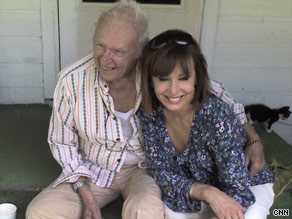
by Janet Crain
© Janet Crain
Click here to view all recent Sarah Palin in 2012 posts
Sarah Palin and the current political scene.
All Politics, All the Time!!!

CNN's Susan Lisovicz sat down with her uncle Lenny Lisovicz, a decorated D-Day veteran, to talk about his experiences at war.

CNN's Susan Lisovicz spoke to her Uncle Lenny about his D-Day and war experiences.
For 65 years my family had heard whispers that he and 220 men stormed Omaha Beach and that he and his captain later went AWOL in Paris, France.
They heard he returned to combat and fought all the way to Germany and his courage was rewarded with the prestigious Silver Star.
Then -- after that sacrifice and loss -- he was committed to a hospital.
On the 65th anniversary of D-Day, Uncle Lenny finally talked at length about everything he had seen and done. And he said it was all true.
Nowadays, Uncle Lenny lives a tranquil life. At 91, he is proud of his garden, where he grows corn, tomatoes and grapefruit. He takes in stray cats, attends Mass and sends money regularly to Catholic missionaries.
But his thoughts are never far away from a sliver of sand thousands of miles away. He turned down my offer to visit Normandy.
"I don't want to see it. I try to rub that out of my mind. It won't go away," he said.
But now, he finally agreed to share his memories. ![]() Watch Uncle Lenny describe storming the beach » See below.
Watch Uncle Lenny describe storming the beach » See below.
It began with The Longest Day: June 6, 1944. My uncle was a 26-year-old lieutenant with the Army 1st Infantry Division, the famed "Big Red One." They had been training in England for something big for months.
Then, over the loudspeakers in the barracks came the famous declaration from Gen. Dwight Eisenhower: "You are about to embark on the Great Crusade."
The Germans were taken by surprise in one of the greatest amphibious invasions of all time, which would mark a turning point of the war in Europe.

“I don’t want the folks who created the mess to do a lot of talking. I want them just to get out of the way so we can clean up the mess. I don’t mind cleaning up after them, but don’t do a lot of talking.”~~ Barack Obama, at a rally for State Senator Creigh Deeds, Tysons Corner, Virginia, August 6, 2009


Experience hath shewn, that even under the best forms of government those entrusted with power have, in time, and by slow operations, perverted it into tyranny. ~ Thomas Jefferson




"We in America do not have government by the majority.
We have government by
the majority who participate."
- Thomas Jefferson.
"Think as I think," said a man,
"Or you are abominably wicked;
You are a toad."
And after I had thought of it,
I said, "I will, then, be a toad."
--Stephen Crane



|
"To compel a man to subsidize with his taxes the propagation of ideas which he disbelieves and abhors is sinful and tyrannical."Thomas Jefferson
'There's no doubt that Lincoln held office during difficult
times...But think of poor George Washington...He didn't have a previous administration to blame for his problems.'
I am an Anti-government Gunslinger, also known as a libertarian conservative. I believe in smaller government, states’ rights, gun rights, and that, as Reagan once said, “The nine most terrifying words in the English language are, ‘I’m from the government and I’m here to help.’”
Take the quiz at www.FightLiberals.com



